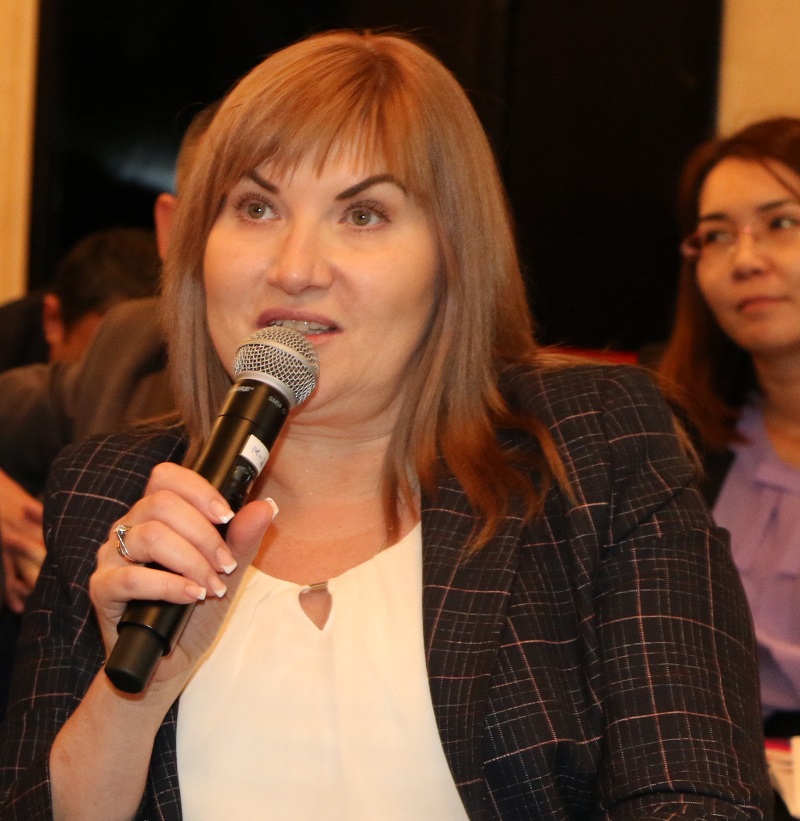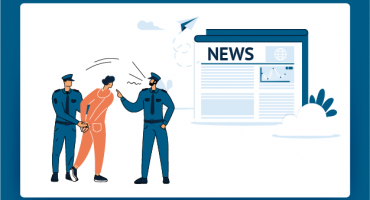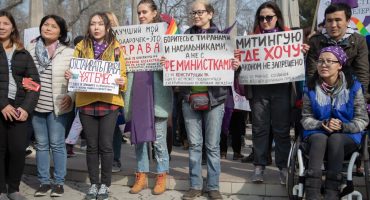Read why the media should be moderating comments posted under their materials and whether they should quote hate speeches of politicians in our interview with Inga Sikorskaya, media expert, director of the School of Peacemaking and Media Technology in Central Asia.

Inga Sikorskaya
– What is a hate speech?
The term ‘hate speech’ is not mentioned in the laws of the Central Asian states.
In the global practice, the illegal forms of hate speech are qualified as discriminatory laws. The states of Central Asia and Kyrgyzstan do not have comprehensive anti-discrimination laws. What they have is only separate articles with too broad interpretations.
They [anti-discrimination laws] contain the basic concept of public incitement of hatred. It is based on the terminology of the international law and explicitly criminalises all expressions that incite dangerous acts that may have severe consequences.
– How is hate speech classified?
– In terms of international standards and our context (the context of Central Asian states – author’s note), hate speech must be divided into negatively evaluative content that is acceptable in terms of the freedom of expression, and illegal content that may come under any sanction or restriction. In other words, clichéd evaluative expressions regarding any race, ethnic, religious, gender, social group that contain no clear calls for reprisals are negatively evaluated form.
But if they contain such words as “beat”, “burn”, “kill”, “blow them up” and a specific description of such actions and the reason for them and the target of them, they can be qualified as illegal content.
– Can hate speech appear in journalist’s materials by the author’s mistake?
– Of course, it can. In many cases, it’s not by error, but because of the power of habit to think stereotypically. Hate speech is based on stereotypes that are ingrained within us in a family, at a kindergarten, school, university. A journalist can be the carrier of such stereotypes.
In addition, a journalist may not have a proper level of political correctness, ethics. This is related to their level of culture. He/she may think it is correct as this is what their family members or friends say. Also, a journalist may become the hate speech disseminator because they quote speakers, respondents, public leaders, politicians who disseminate hate speech.
– Do you mean that hate speeches of public persons may not be quoted?
– Hate speech disseminators must be shown to the public so that people know who they vote for. When we speak about politicians who use hate speech in their speech, these instances should be put into a context to show the value of a given politician to the audience, whether he/she is rabid, radical, far right nationalist, or other. They should not be quoted at all, but you can show the audience what it he/she like.
– What if a journalist decides to quote?
– This must not be done in the ‘no comment’ mode. Such mistakes were made in October 2020, when all information about the events in Bishkek was disseminated, and unbalanced information containing hate speech was delivered.
When the ex-mayor of Osh appeared, his speech full of nationalistic statements was quoted in full. No one took a comment from an expert, say, of the Kyrgyzstan-based Coalition for Equality, who would say it was public hate speech that can have serious consequences.
– Is one expert enough to balance out the hate speech?
– Yes, but in fact it is difficult to find the one because there’s a problem with experts – not all want to give comments regarding such speeches. There are no common approaches, like there’s no common vision. This is due to the fact that in the countries that comply with international standards hate speech is found illegal in their anti-discrimination laws. While Kyrgyzstan has no such law. Our legal practitioners often follow the anti-extremism law.
– What form of hate speech is most often used in Central Asian states?
– Most often, we see the negatively evaluated form of hate speech that is acceptable in terms of the freedom of expression. However, in some cases it can be unacceptable in terms of ethics. Hate speech is very flexible and in certain public political contexts negatively evaluated expression can become illegal.
How will it happen? If something happens tomorrow in the world that provokes the outbreak of religious intolerance, then any hostile statements against the target group may hurt its representatives, cause the protest, or even cause direct violence.
– How can we understand the fine line between the acceptable and unacceptable forms of hate speech?
– It can be determined by looking at certain markers. Including, the general socio-political context. If tomorrow, for instance, we start discussing Chinese investments and people start protesting at deposits demanding Chinese investors leave, this target group (ethnic Chinese – author’s note) will be the target of hate speech, which can turn into direct violence, as it used to be several times in Kyrgyzstan. The same can happen to any other group.
– Is it possible to avoid hate speech in full?
– It’s a paradox: with more freedom of expression, comes more hate speech. This paradox applies to the societies with low level of tolerance, issues of the culture of public debates. This is what our society needs badly.
We can reduce the number of hostile statements if we create the balance between those who join the discussion by educating them and guiding them into the framework of peaceful and cultural dialogue. However, there’s a concern that we are too far from it.
– Should the media moderate comments posted under their materials and publications in social media to avoid discussions containing hate speech?
– In recent years, we see the increase in the number of fake news and trolling. Therefore, I believe we must moderate comments. International media have already come to this decision. But we should not moderate using censorship. Moderation should be based on ethics and the freedom of expression. Special people must be assigned to do it in editorial offices. They must actively interact with commentators who spread hate speech, contact them, try to neutralise them at the communication level.
The practice and study of international experience show that in some cases it leads to the desired outcome and people change their attitudes and stop using hate speech. It’s certainly additional economic load on the media, but if editors say they have no resources to implement this activity, we’ll be in a situation when we (the Kyrgyz media outlets – author’s note) are regulated from above, just like in neighbouring states, and this risk is very likely to happen.
– Which groups of people are most hated in Central Asian states? Are there any very sensitive topics of journalistic materials that may cause hate speech?
– Now we have a mixture of trends – hate content, fake news, trolling and flaming – they all may cause verbal aggression. Sensitive topics that can act as a catalyst are acute socio-political issues, discussion of identities of people and groups (religious, gender, ethnic, social), political views in various contexts.
In Central Asian states, we have such sensitive topics as discussions about corruption and corrupt officials, the rich and the poor, land, water, border disputes, and the influence of geopolitical actors on the country. As you can see, there’s a very wide range of topics.
– Are trolls and haters the same?
– The term of “haters” from English ‘hate’ referred to professional hate groups that were widely spread on the internet and formed in the pre-digital age in the offline environment. The world has nearly three million ‘hate groups’ that are actively working on messengers and social media. These are mainly xenophobic digital communities. The term of ‘haters’ refers to them.
In the Central Asian online space, there are a couple of dozens groups that spread intolerance persistently just like other global digital tribes. Hate speech disseminators who are called ‘haters” in discussions are in fact either improper users with a low level of education, or unethical journalists, or common trolls. The latter may be fakes specially created for a one-time project, say, political project, just like it was during the parliamentary election in Kyrgyzstan.
Prominent public speakers, politicians, opinion leaders and journalists may easily troll using hate speech. Trolling qualified as verbal aggression on the internet is not a new phenomenon in the social environment. It dates back to the 19th century, and has become available to all in the digital age.
– How to fight haters? What methods may be used?
– If it is a really xenophobic group that spreads hate speech, you can analyse their content for extreme forms of hate speech. If it is a fake account that spreads targeted verbal attacks, propaganda, virulent abuses, the measures will be different. If it is a public speaker with a large audience who disseminates hate speech that may have consequences in the offline environment, this is another case.
On the other hand, the key mechanisms to overcome hate speech are education, promotion of diversity, support of various identities in the society as its basis via relevant laws and introduction of tolerance into local culture.
In our internet environment, users use ‘rude language’ that demonstrates the lack of culture in online communications, lack of education in public discussions, no format of proper discussions about sensitive issues and no understanding of the fact that we are placed in one environment with no boundaries in it. Therefore, every case of intolerance is thriving immediately.
Journalism has many tools to overcome hate speech. I think the media and journalists must be the key conductors of new formats of discussions to be able to promote the idea within the society.
This publication was produced as part of the mentorship programme under the Development of New Media and Digital Journalism in Central Asia project delivered by the Institute for War and Peace Reporting (IWPR) with support from the UK Government. It does not necessarily reflect the official views of IWPR or the UK Government
If you have found a spelling error, please, notify us by selecting that text and pressing Ctrl+Enter.





